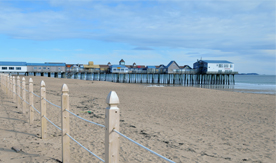
Maine and New Hampshire EPSCoR Receive $6 Million to Address Health of Coastal Ecosystem
Maine and New Hampshire’s coastal tourism and shellfish industries contribute millions of dollars annually to the regional economy. In Maine in 2010, coastal tourism and recreation added $1.1 billion to Maine’s gross domestic product, while shellfish landings in that same year generated revenues of $347 million. But these industries and the coastal environment they depend on are vulnerable to a variety of factors, including pollution, climate change and invasive species.
A team of researchers led by the University of Maine and the University of New Hampshire will conduct a three-year study of the many factors affecting the health of their shared coastal ecosystem. This collaboration, funded by a $6 million award from the National Science Foundation (NSF), aims to strengthen the scientific basis for decision making related to the management of recreational beaches and shellfish harvesting. This research is a direct outgrowth of Maine’s Sustainability Solutions Initiative, supported by the NSF EPSCoR program.
The project, titled the New England SusTainability Consortium (NEST), is managed by the EPSCoR programs at UMaine and UNH in partnership with College of the Atlantic, University of New England, University of Southern Maine, Great Bay Community College, Plymouth State University and Keene State College. In Maine, researchers will also collaborate with several state agencies and other stakeholders, including the Maine Department of Environmental Protection, Maine Department of Marine Resources, Maine State Department of Education and Maine Healthy Beaches.
“I am delighted that the National Science Foundation selected the New England SusTainability Consortium, for this Research Infrastructure Improvement grant,” said Sen. Susan Collins. “Through both tourism as well as commercial fishing, our state’s economy is highly dependent on the ecological well-being of the Gulf of Maine. This grant will help fund the vital research performed by faculty and students at the University of Maine as they seek to find ways to reduce pollution caused by coastal runoff and assist local governments in making informed decisions regarding the closure of beaches and shellfish beds.”
“This is good news for Maine, and indeed for all coastal areas,” said Sen. Angus King. “Our shellfish industry is facing many threats an climate change, warming oceans, acidifying waters, and an increase in green crabs, which are decimating clam flats. Our state simply can’t lose another fishery. I look forward to seeing the results of the good work that this grant will enable, like hopefully more targeted closures of flats. Our changing environment is a big problem, and while we work out broad solutions, we must also focus on mitigating the direct impacts on people and ecosystems.”
UMaine President Paul W. Ferguson affirmed the project’s importance, stating, “This NSF grant recognizes the leadership and contribution of University of Maine scholars who aim to support coastal ecosystems, economies, and communities by promoting sustainable policies and practices in Maine.”
The project combines scientific knowledge and local expertise to improve resource management decisions. There is widespread agreement among resource managers and scientists in both states that current beach and shellfish management decisions are challenging and can be improved by strengthening partnerships among scientists, managers and communities.
NEST uses a collaborative process where resource managers and other stakeholders participate in defining problems, identifying research needs, interpreting results and designing solutions. The team will select a number of study sites in each state to investigate how natural processes like water flow in rivers, and human activities like land development, in coastal watersheds influence bacterial dynamics. Project research will advance understanding of how environmental and climatic conditions affect the dynamics of bacterial pathogens. The project studies how human activities contribute to and are affected by these bacterial dynamics and related public resource management decisions. Coupling these distinct strands of research offers a more comprehensive view of beach and shellfish management. This innovative approach seeks to generate cost-effective strategies for reducing bacterial pollution. By identifying solutions that strategically avert risks to humans, while supporting economic development and ecosystem health, NEST will develop regional capacity between Maine and New Hampshire to advance sustainability solutions through science.
Maine’s Sustainability Solutions Initiative (SSI) is supported in large part by a $20 million, five-year investment through the National Science Foundation’s Experimental Program to Stimulate Competitive Research (NSF EPSCoR Program). SSI enhances Maine’s research capacity and promotes innovation and societal benefit through the field of sustainability science. This innovative initiative represents an extensive network of over 350 researchers and students and more than 200 community-based stakeholders working together to advance solutions across Maine.
Contact: Andrea Littlefield, 207.581.2289
